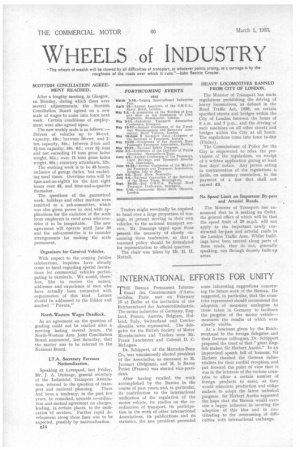INTERNATIONAL EFFORTS FOR UNITY
Page 28

If you've noticed an error in this article please click here to report it so we can fix it.
THE Bureau Permanent International des Constructeurs d'Auto. mobiles, Paris, met on February 15 at Berlin at the invitation of the Reichsverband der Automobilindustrie. The motor industries of Germany, England, France, Austria, Belgium, Holland, Italy, Switzerland and Czechoslovakia were represented. The delegates for the British Society of Motor Manufacturers and Traders were Mr. Frank Lanchester and Colonel D. C. McLagan.
Dr. Schippert, of the Mercedes-Benz Co., was unanimously elected president of the Association as successor to M. Joassart (Belgium), and M. le Baron Petiet (France) was elected vice-president.
After having recalled the work accomplished by the Bureau in the course of past years, and, in particular, its contribution to the international unification of the regulation of the motor vehicle, its studies on the coordination of transport, its participation in the work of other international Associations, its publications and its statistics, the new president presented
some interesting suggestions concerning the future work of the Bureau. He suggested, in particular, that the countries represented should recommend the adoption of measures analogous to those taken in Germany to facilitate the progress of the motor vehicle—. measures the results of which were already visible.
At a luncheon given by the Reichsverband to the foreign delegates and their German colleagues, Dr. Schippert proposed the toast of that "great English maker, Sir Herbert Austin." In 'an improvisedspeech full of humour, Sir Herbert thanked the German industrialists for their cordial reception, and put forward the point of view that it was in the interests of the various countries to allow a certain number of foreign products to enter, as they would stimulate production and oblige makers to adopt the latest technical progress. Sir Herbert Austin expressed the hope that the Bureau would exercise a happy influence in securing the adoption of this idea and in contributing to the overcoming of difficulties with international exchange.




























































































